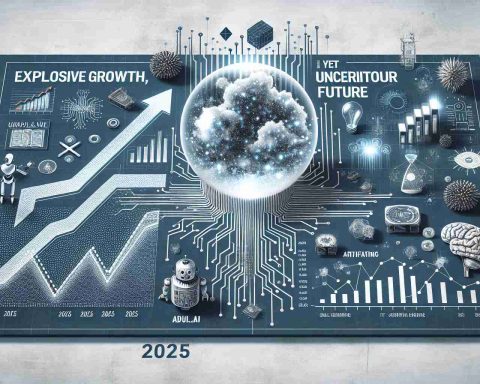Exciting technological advancements are reshaping the biotech industry, and one company at the forefront is Recursion Pharmaceuticals. This innovative entity is pioneering the use of artificial intelligence (AI) to revolutionize drug discovery, creating a buzz among investors seeking the next big breakout stock.
AI Powerhouse in Biotech
Recursion is carving out a significant niche with its AI-driven approach. At the core of its technology is the BioHive-2 supercomputer—one of the world’s most advanced systems, bolstered by Nvidia AI chips. With cutting-edge machine learning capabilities, BioHive-2 sifts through massive biological datasets to pinpoint potential drug targets, optimizing both the identification of promising compounds and enhancing patient-specific treatments. This method streamlines the research process, cutting costs and expediting development compared to traditional methodologies.
A notable event for Recursion was its strategic merger with Exscientia, a leader in AI-driven chemical design. This merger creates a fully integrated platform, enhancing their capabilities and ushering in a stronger, more versatile company.
Bright Horizons, But Proceed with Caution
Among Recursion’s array of promising drug candidates, REC-994 stands out for its potential to address cerebral cavernous malformation (CCM), a currently untreated brain condition. Another promising candidate, REC-617, is showing breakthrough results in early solid tumor studies. Despite this potential, the road to commercial viability isn’t without challenges.
Currently, Recursion faces hurdles with high operating costs and limited revenue streams. Analysts anticipate ongoing financial losses, underscoring the risks involved. Moreover, the competitive landscape is tight with major pharmaceutical giants also leveraging AI technologies.
Though Recursion holds potential, its future hinges on upcoming clinical trials and regulatory decisions, setting the stage for a defining moment by 2025. Investors may find it wise to remain cautious while keeping an eye on this intriguing biotechnology venture.
How Recursion Pharmaceuticals is Rewriting Biotech with AI: Pros, Cons, and What’s Next
The biotech industry is witnessing transformative changes, largely influenced by groundbreaking technologies such as artificial intelligence (AI). At the forefront of this transformation is Recursion Pharmaceuticals, which combines cutting-edge AI with biotechnology to better understand and develop drug treatments. Let’s delve into some aspects of this innovative approach, including its recent advancements, market trends, and what investors might expect in the future.
AI Innovations and the Power of BioHive-2
Recursion Pharmaceuticals uses AI innovations, primarily through its BioHive-2 supercomputer, to advance drug discovery. This machine, powered by Nvidia AI chips, stands as one of the most sophisticated systems globally, effectuating a revolution in processing biological data. It holds the capability to identify potential drug targets with unprecedented agility, minimizing costs and development time, which are significant constraints in traditional methods. These efforts promise optimized and customized patient treatments, potentially changing the landscape of medical research and application.
Strategic Merger with Exscientia
The strategic merger with Exscientia has provided Recursion with an enhanced platform that integrates sophisticated AI-driven chemical design with its existing capabilities. This partnership is designed to capitalize on both companies’ strengths, improving the pipeline for drug candidates, and creating a comprehensive approach that is expected to bring more robust solutions to market faster. This strategic expansion marks a significant milestone, bringing complex AI design strategies fully into the sphere of practical drug development.
Pros and Cons of AI-driven Drug Discovery
Pros:
– Efficiency and Speed: AI significantly reduces the research and development phase, assisting in faster identification of viable drug candidates.
– Cost Reduction: Optimized processes lead to decreased operational costs, which is crucial in a financially demanding industry.
– Personalized Medicine: By analyzing vast biological datasets, AI promotes tailoring treatments to individual patient needs.
Cons:
– High Initial Costs: The deployment of advanced technologies like AI involves substantial initial investment and ongoing maintenance costs.
– Regulatory Challenges: Navigating regulatory approvals for AI-developed drugs presents new hurdles, requiring specialized expertise.
– Competitive Pressure: The biotech sector sees increasing competition as more companies integrate AI, challenging Recursion to continually innovate.
Future Predictions and Market Considerations
The future of Recursion Pharmaceuticals seems both promising and challenging. As it ventures into more clinical trials and anticipates regulatory approvals by 2025, the success of its drug candidates like REC-994 and REC-617 becomes pivotal. Investors, while recognizing the promise, must also consider the inherent risks associated with soaring operational costs and the need for significant revenue to offset financial losses. The biotech industry is at an inflection point where AI not only augments traditional methods but starts to set a new standard.
For further insights on biotechnology advancements, you can visit the official Recursion Pharmaceuticals website.
















